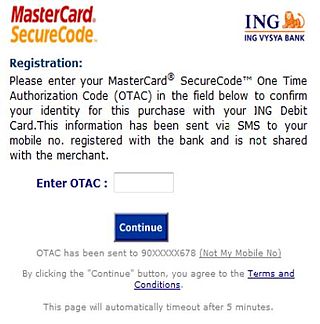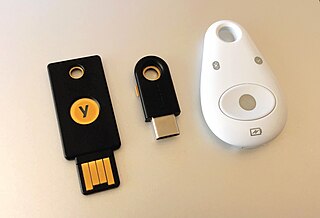
Near-field communication (NFC) is a set of communication protocols that enables communication between two electronic devices over a distance of 4 centimetres (1.6 in) or less. NFC offers a low-speed connection through a simple setup that can be used for the bootstrapping of capable wireless connections. Like other proximity card technologies, NFC is based on inductive coupling between two electromagnetic coils present on a NFC-enabled device such as a smartphone. NFC communicating in one or both directions uses a frequency of 13.56 MHz in the globally available unlicensed radio frequency ISM band, compliant with the ISO/IEC 18000-3 air interface standard at data rates ranging from 106 to 848 kbit/s.
Single sign-on (SSO) is an authentication scheme that allows a user to log in with a single ID to any of several related, yet independent, software systems.
Identity management (IdM), also known as identity and access management, is a framework of policies and technologies to ensure that the right users have the appropriate access to technology resources. IdM systems fall under the overarching umbrellas of IT security and data management. Identity and access management systems not only identify, authenticate, and control access for individuals who will be utilizing IT resources but also the hardware and applications employees need to access.

A one-time password (OTP), also known as a one-time PIN, one-time authorization code (OTAC) or dynamic password, is a password that is valid for only one login session or transaction, on a computer system or other digital device. OTPs avoid several shortcomings that are associated with traditional (static) password-based authentication; a number of implementations also incorporate two-factor authentication by ensuring that the one-time password requires access to something a person has as well as something a person knows.

An electronic identification ("eID") is a digital solution for proof of identity of citizens or organizations. They can be used to view to access benefits or services provided by government authorities, banks or other companies, for mobile payments, etc. Apart from online authentication and login, many electronic identity services also give users the option to sign electronic documents with a digital signature.
Records management, also known as records and information management, is an organizational function devoted to the management of information in an organization throughout its life cycle, from the time of creation or receipt to its eventual disposition. This includes identifying, classifying, storing, securing, retrieving, tracking and destroying or permanently preserving records. The ISO 15489-1: 2001 standard defines records management as "[the] field of management responsible for the efficient and systematic control of the creation, receipt, maintenance, use and disposition of records, including the processes for capturing and maintaining evidence of and information about business activities and transactions in the form of records".

Keychain is the password management system in macOS, developed by Apple. It was introduced with Mac OS 8.6, and has been included in all subsequent versions of the operating system, now known as macOS. A Keychain can contain various types of data: passwords, private keys, certificates, and secure notes.
Traction TeamPage is a proprietary enterprise 2.0 social software product developed by Traction Software Inc. of Providence, Rhode Island.
This is a comparison of online backup services.
The DLM Forum is a European membership community of public archives and parties interested in archives, records and information management throughout the European Union. Membership is open to all. The Forum is known for its creation of the MoReq series of records management standards.

Multi-factor authentication is an electronic authentication method in which a user is granted access to a website or application only after successfully presenting two or more pieces of evidence to an authentication mechanism. MFA protects personal data—which may include personal identification or financial assets—from being accessed by an unauthorized third party that may have been able to discover, for example, a single password.
MoReq2 is short for “Model Requirements for the Management of Electronic Records”, second version. It consists of a formal requirements specification for a generic electronic records management system, accompanied by testing documentation and related information. Published in 2008 by the European Commission, it is intended for use across the European Union, but can be used elsewhere. MoReq2 is generally considered a de facto standard in Europe but it does not have any formal status as a standard.
Apple Account, formerly known as Apple ID, is a user account by Apple for their devices and software. Apple Accounts contain the user's personal data and settings. When an Apple Account is used to log in to an Apple device, the device will automatically use the data and settings associated with the Apple Account.
Fabasoft AG is a software manufacturer headquartered in Linz, Upper Austria. The company was established in 1988 by Helmut Fallmann and Leopold Bauernfeind.

iCloud is a cloud service operated by Apple Inc. Launched on October 12, 2011, iCloud enables users to store and sync data across devices, including Apple Mail, Apple Calendar, Apple Photos, Apple Notes, contacts, settings, backups, and files, to collaborate with other users, and track assets through Find My. It is built into iOS, iPadOS, watchOS, tvOS, macOS, and visionOS. iCloud may additionally be accessed through a limited web interface and Windows application.

ownCloud, a Kiteworks Company, is a free and open-source software project for content collaboration and sharing and syncing of files in distributed and federated enterprise scenarios. It allows companies and remote end-users to organize their documents on servers, computers, and mobile devices and work with them collaboratively while keeping a centrally organized and synchronized state.

Google Cloud Messaging (GCM) was a mobile notification service developed by Google that enables third-party application developers to send notification data or information from developer-run servers to applications that target the Google Android Operating System, as well as applications or extensions developed for the Google Chrome internet browser. It was available to developers free of charge. The GCM Service was first announced in June 2012 as a successor to Google's now-defunct Android Cloud to Device Messaging (C2DM) service, citing improvements to authentication and delivery, new API endpoints and messaging parameters, and the removal of limitations on API send-rates and message sizes. It has been superseded by Google's Firebase Cloud Messaging (FCM) on May 29, 2019.

Enpass is a cross-platform offline password management app available as a freemium software with subscription plans as also with one time payment licence.

Nextcloud is a suite of client-server software for creating and using file hosting services. Nextcloud provides functionality similar to Dropbox, Office 365 or Google Drive when used with integrated office suites Collabora Online or OnlyOffice. It can be hosted in the cloud or on-premises. It is scalable, from home office software based on the low cost Raspberry Pi, all the way through to full sized data centers that support millions of users. Translations in 60 languages exist for web interface and client applications.
Smart-ID is an electronic authentication tool developed by SK ID Solutions, an Estonian company. Users can log in to various electronic services and sign documents with an electronic signature.









